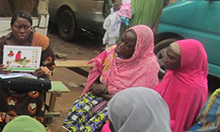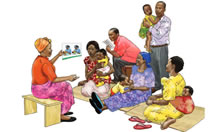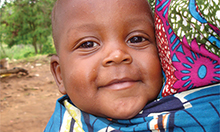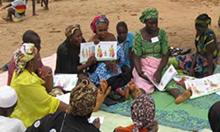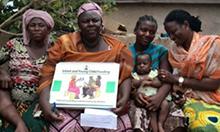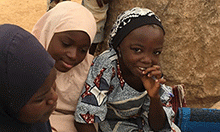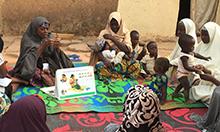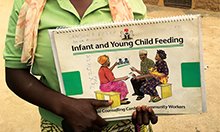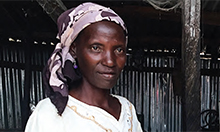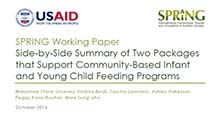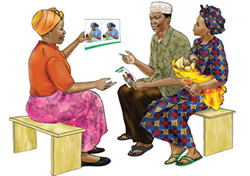Background
Community based infant and young child feeding (IYCF) promotion, counseling, and support has been acknowledged as one of the key pillars for improving nutritional status during the critical first 1,000 days. In 2010, UNICEF published a global Community Infant and Young Child Feeding (C-IYCF) Counseling Package designed to equip community volunteers (CV) and primary health care staff to support mothers, fathers, and other caregivers to optimally feed their infants and young children. The training component of the package is intended to prepare CVs with technical knowledge on the recommended breastfeeding and complementary feeding practices for children from 0 to 24 months and on optimal nutrition practices for pregnant and lactating women. In addition, the training enhances practical skills in group facilitation, interpersonal communication and counseling, support to mothers and caregivers, problem solving, and reaching-an-agreement (negotiation) skills and prepares participants to effectively use the related counseling tools and job aids.
The package includes an Adaptation Guide, Facilitator’s Guide, Training Aids, Participant Materials, 24 IYCF Counseling Cards, Key Messages Booklet, take-home brochures, Supervision, Mentoring and Monitoring module, as well as a Planning Guide with specific guidance for adaptation at country level with emphasis on the development of messages targeting cultural barriers to optimal breastfeeding and complementary feeding practices. Guidance and tools for data collection, monitoring, quality assurance and supervision, as well as development of contextually appropriate local graphics for training aids and counseling material are also included. These essential elements are designed to ensure an effective, sustained and quality program. To date, approximately 30 countries are adapting the C-IYCF Counseling Package to the local context, building capacity, and beginning implementation of community-based IYCF programming.
Nigeria’s Federal Ministry of Health (FMOH), with support from two USAID-funded global nutrition projects (IYCN and SPRING), has made a significant investment in the adaptation of the generic package to the Nigerian context. In 2012, the package was published in English and six local languages. Since then, the FMOH has committed to a national rollout of the C-IYCF program, starting in several Nigerian states where funding has been secured.
In spite of the global interest in the C-IYCF Counseling Package, little is known about its impact on IYCF behaviors in the countries where it has been adapted. For this reason, high quality studies are needed, and Nigeria offers a unique opportunity to address this major gap in global evidence. After consultations with both SPRING and UNICEF, the FMOH has agreed to conduct an evaluation of the package and share the findings both nationally and internationally, to inform future investments in C-IYCF programming.
Study Rationale & Objectives

The main purpose of this study is to assess the effectiveness of the C-IYCF Counseling Package in improving IYCF behaviors in an environment supportive of its design, management, technical assistance, and monitoring when adapted for local context and implemented at scale. While the study is not nationally representative, the findings should be useful for national-level decision-making in Nigeria. The results of this study will also make an important scientific contribution to the field of nutrition, in which there is relatively little evidence on the impact of a large-scale community-based IYCF counseling intervention.
The objectives of the study are to:
- Assess the environment or context in terms of how it enabled or hampered success of the implementation of the C-IYCF program in Kaduna State, Nigeria.
- Assess C-IYCF counseling program processes, implementation achievements, and costs.
- Evaluate the outcomes of implementation of the C-IYCF Counseling Package on counseling and communication skills and knowledge of IYCF among CVs.
- Establish the impact of implementation of the C-IYCF Counseling Package on caregivers’ knowledge, attitudes, beliefs, and practices related to IYCF.
Study Location
The study is being conducted in one intervention local government area (LGA) and one comparison LGA in the state of Kaduna. Kaduna was selected based on the following inclusion criteria:
- limited intensive community-based nutrition interventions;
- very limited exposure to IYCF counseling and communication;
- severe food insecurity is not a major factor;
- socially stable environment free of civil unrest; and
- willingness and commitment of community leadership to support and facilitate implementation of the C-IYCF Counseling Package.
The intervention LGA will be Kajuru and the comparison LGA will be Kauru, selected because of its similar geographic and socio-demographic characteristics to Kajuru. The FMOH plans to implement C-IYCF in the comparison LGA once the endline of this study has been completed, in late 2016 or early 2017.
Study Design
The study will follow a quasi-experimental design using a mixed-methods approach to answering the research questions. Quantitative and qualitative data will be collected at baseline and endline – 18 months after the start of program implementation – using a number of different data collection methods described below. While the facility assessment, the semi-structured interviews, and the survey of CVs and health workers will be longitudinal (i.e., every attempt will be made to follow the same individuals at baseline and endline), the maternal survey will capture repeated cross-sectional samples of pregnant women and mothers/caregivers of children under two years.
Figure 1: C-IYCF Program Impact Pathways

Intervention

The C-IYCF program will be implemented by the Kaduna State Ministry of Health (SMOH) and Kajuru LGA with support from UNICEF/Nigeria. Following sensitization activities at the state and LGA levels, health authorities and workers will be trained by in-country master trainers. The master trainers and trained health workers will then train CVs nominated by community leaders in order to achieve a ratio of approximately one CV per 25-30 children under the age of two. Health workers will supervise CVs to will conduct a minimum of one support group per month for pregnant women, mothers of children under two, and their partners and other family members. In addition, community leaders will organize mobilization activities to encourage social support.
A fundamental aspect of this study is the sustainability and scalability of the intervention. As such, cost containment and local ownership and responsibility are considered key. In addition, the intervention will be implemented with minimal outside funding, building on established health and community systems.
Related Resources
IYCF: A Tool for Assessing National Practices, Policies, and Programs
Support Groups Making a Difference in Women's Lives: Baby Aisha’s Story

